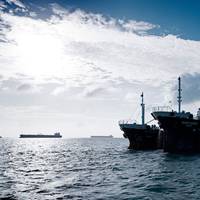Jones Act Tankers Booked for Storage, Foreign Trips Amid Oil Glut
Oil traders are hiring expensive U.S. vessels, normally only used for domestic shipments, to store gasoline or ship fuel overseas, five shipping sources said, in a sign of the energy industry's desperation for places to park petroleum amid a 30% drop in worldwide demand.Billions of people worldwide are living under confinement rules due to the coronavirus pandemic, destroying demand for gasoline and other fuels and creating a supply glut. Storage tanks onshore and floating storage in tankers on the water are rapidly filling, leaving fewer options for traders looking to sock away oil.Several shippers said they have started to book Jones Act (JA) vessels for foreign voyages or to store refined products.
Hedge Funds Hunt for Shipping Debt

A growing number of hedge funds are moving into shipping debt, an asset class few have invested in before, looking to buy up loans and bonds as banks cut their exposure to the troubled sector.World economy worries and cost pressures are dampening prospects for a proper recovery in many segments of the shipping sector, which has struggled with tough markets for a decade.Meanwhile European banks, particularly German lenders, are trying to offload distressed and performing loans…
Commodities Shipping Firms Struggle to Ride Out Worst Downturn
Shipping companies transporting coal, and iron ore and other commodities are urgently seeking ways to conserve cash and withstand the worst market downturn on record as too many ships chase shrinking business. A shortage of financing - estimated at $30 billion and caused in part by banks cutting lending to sectors such as shipping - has also hurt companies, sending some to the wall. "The overall prospects for the dry bulk market are fairly dark - it seems that there is little faith in the market for a recovery. The market mood deteriorates by the day, despite the recent improvement of the Baltic Index," said Basil Karatzas, head of consultancy and brokerage Karatzas Marine Advisors & Co.
Chinese Shippers Order for 30 Valemax Vessels
The Chinese shipping companies - Chinese shipping majors Cosco Group, China Merchants Group and ICBC Financial Leasing Co- ordered 30 Valemaxes worth a combined $2.5 billion for delivery starting from 2018, deployed on Brazil-China trade routes, reports WSJ. The vessels will bosst the trade between China and Brazil and also will invest billions of dollars into delaying shipbuilding industry in the country. The vessel will be employed on Brazil-China trade routes, boosting the import of Vale iron ore in China. Sources said the three state-controlled shipping companies ordered 10 ships each from four local yards—Shanghai Waigaoqiao Shipbuilding, Beihai Shipbuilding, CIC Jiangsu and Yangzijiang Shipbuilding—with deliveries scheduled to begin in 2018.
Survival of Fittest for 2016 Commodity Shippers
Downturn in dry freight market started in 2008; more ships expected to hit the water next year. Shipping companies that transport commodities such as coal, iron ore and grain face a painful year ahead, with only the strongest expected to weather a deepening crisis caused by tepid demand and a surplus of vessels for hire. The predicament facing firms that ship commodities in large unpackaged amounts - known as dry bulk - is partly the result of slower coal and iron ore demand from leading global importer China in the second half of 2015. The Baltic Exchange's main sea freight index - which tracks rates for ships carrying dry bulk commodities - plunged to an all-time low this month.
Cosco, China Shipping Merger Gets Green Signal from Beijing
China State Council has given the go-ahead for country's two largest shipping conglomerates to merge, continuing a trend in the industry to trim down state-owned enterprises, reports Caixin Media. The China Ocean Shipping Co. (COSCO Group) and China Shipping Group Co. have been working on a deal since August. The listed subsidiaries of the two firms are expected to make separate statements on their next step on December 11, the executive said. Meanwhile, WSJ reported that the shipping companies plan to issue details of their long-expected multibillion-dollar merger plans as early as Friday, quoting people with knowledge of the matter.
Norway's Offshore Shipping Sector Faces Bleak Year
Norwegian companies that provide supply ships and drilling rigs to the global oil industry face a bleak year ahead as contracts disappear and financing options dwindle in the face of weak global crude prices. They could increasingly be forced to sell or write down the value of assets, cut jobs and tap shareholders for cash to weather the downturn, according to industry experts. This would herald more pain for Norway, where the overall oil sector accounts for about a fifth of the economy and unemployment is rising, especially in the oil capital Stavanger and its environs on the west coast. Oil firms like Statoil, which offshore shipping companies rely on for business, have slashed costs and projects to cope with a 60-percent plunge in crude prices since June last year.
Dry Bulk Shipping Record Low a Warning for Global Economy
A slump in dry bulk shipping is set to worsen as the meltdown in global commodities and too many ships free for hire rock the sector used by investors to gauge the health of world trade. Slower coal and iron ore demand from China - the world's biggest industrial importer - have battered the dry bulk sector, already in the midst of its worst ever downturns that is expected to extend well into next year. This week the Baltic Exchange's main sea freight index , which tracks rates for ships carrying dry bulk commodities and seen by investors as a forward-looking indicator of global industrial activity, plunged to an all-time low. A slump in oil and other commodity prices, due to slowing Chinese demand, has widely been seen as one of the reasons for U.S.
Tide Turns in Favor of Greece’s Shipping Industry
An article in WSJ highlighted the Greek shipping industry, which it says has "emerged largely unscathed" from the nation's recent financial troubles. The reports say that shipping companies in Greece are buying vessels from cash-strapped competitors and German banks, and are poised to grab even more market share - but bailout-related tax hikes could lead shipowners to seek cheaper waters. Greek owners, who operate almost a fifth of the global fleet of merchant ships, are paying rock-bottom prices for competitors’ vessels. Shipping employs more than 200,000 people in Greece and contributes around 7.5% of Greece’s gross domestic product.
Shipping Turns From Banks to Equity Markets for Cash
Shipping companies are turning to equity markets to fill a growing funding gap, betting that investors hungry for decent returns will provide capital to a sector recovering from its worst downturn since the 1980s. Ship owners ordered large numbers of vessels between 2007 and 2009, just as the global economy sank into crisis. Prospects have brightened in recent months as world trade picks up and the ship glut is absorbed. The industry still faces a multi-billion dollar financing hole after banks, its traditional source of funding, cut back lending to boost capital in the wake of the financial crisis. Alternative investors such as private equity firms have been snapping up shipping assets including loan portfolios from the banks.
Shippers Turn to Equity Markets as Sector Eyes Recovery

Shipping companies are turning to equity markets to fill a growing funding gap, betting that investors hungry for decent returns will provide capital to a sector recovering from its worst downturn since the 1980s. Ship owners ordered large numbers of vessels between 2007 and 2009, just as the global economy sank into crisis. Prospects have brightened in recent months as world trade picks up and the ship glut is absorbed. The industry still faces a multi-billion dollar financing hole after banks…





